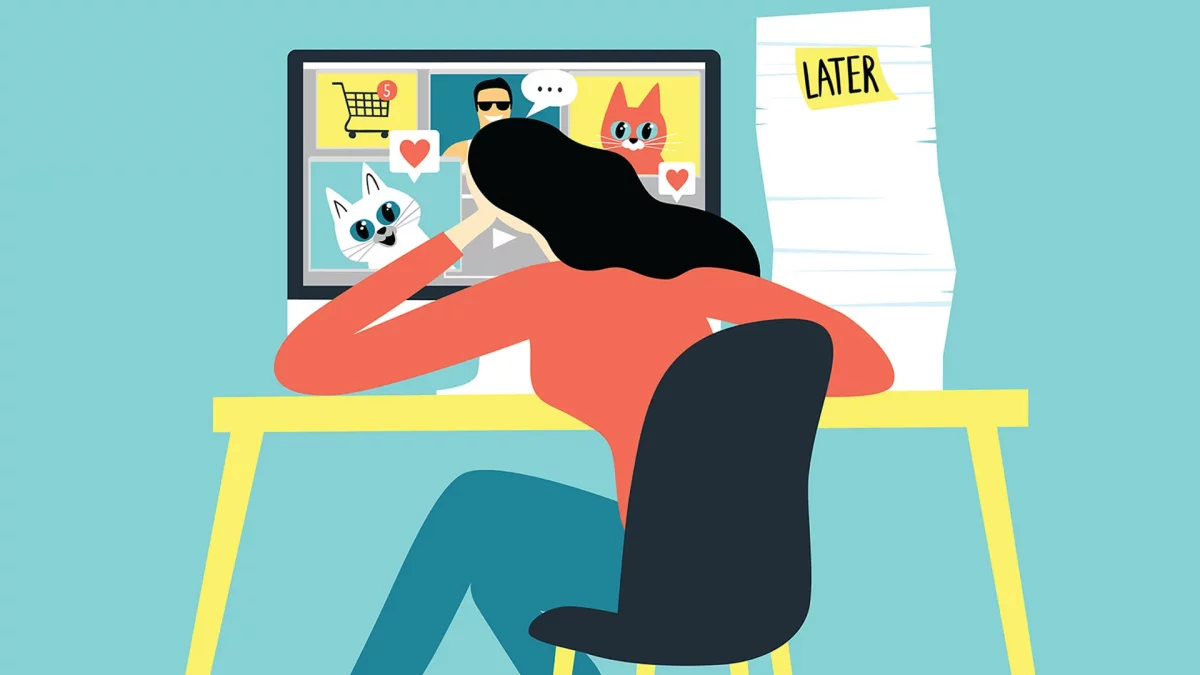When asking themselves how to overcome procrastination, many people will look first to motivation to help them overcome the vicious cycle. This is because people generally feel that motivation is what fuels this action in the beginning.
Think of it as a three-way process:
- Step one is motivation
- Step two is positive optimism. As a result of that motivation,
- The final step is action.
People wanting to fit and toned might plaster their walls and refrigerator with pictures of in-shape people for motivation’s sake. Someone wishing to succeed in business might listen to a motivational speech on self-confidence and achievement. Instinctively, this seems like an excellent place to start.
Athletes get “psyched up” before the big game, after all. The modern world even has a whole slew of speakers and writers whose careers are dedicated to motivating us to overcome procrastination.
Using motivation to make the first step
Motivation is not the procrastination cure. But it can help you make that first step.
Let’s say you want to lose 10 pounds after watching the scale slowly creep up on you. You then inspire yourself to act. You think, “Today is the day I start cutting calories, and I’m going to do it this time.”
You recall how good it felt last time you were physically fit, and you promise that your memories of this proud accomplishment will carry you to the proverbial finish line.
Each morning, you start to psych yourself up, saying, ‘I am going to follow my diet today.’ You read motivational blogs on the subject, and this helps you stay on track with your diet for a while. You see small victories on the scale, which further excites you and renews your motivation.
Not every day will be a delightfully cheerful day. There will be days when your boss reprimands you at work, or you get a ticket for parking in the wrong spot or put salt instead of sugar in your coffee. Your motivation tanks to get up and put in the work- this is, after all, life. So it’s not a cure for everything, but it’s a step to get you started to overcome procrastination.
Using motivation to build willpower
Not giving in to the temptation to indulge in procrastination habits will require a lot of willpower. If you don’t have it, you’ll become even less productive as time goes by. A lack of willpower is one of the most common side effects of procrastination because fighting temptation is going to be an uphill battle, and you will need the willpower to back it up.
If you’re not disciplined enough to put in the work and the effort, you’re never going to accomplish the desired results. It is as simple as that making it hard to overcome procrastination.
Procrastinating and finding excuses to do so is undoubtedly easy. Here’s where motivation can help. By thinking and believing you can, you will have enough brainpower to get up and do what you need to stay committed to meeting your goals.
Procrastinating, a lack of self-discipline, and willpower will prove to be a hindrance because the level of success you achieve will boil down to your attitude at the end of the day. If you spend most of your time just wasting time, then expect that the results you will get will be along those lines.
Motivation and the Negative Mind
Being negative is always the easier option; being positive requires a lot more effort put into it. Having a negative state of mind will only feed into your reasons to procrastinate because you’ll always find a hundred reasons not to do something, even though you may have one good reason why you should.
Sometimes a negative mindset requires a boost, and this could be:
- A change of environment. If you’re stuck in a rut, changing the place you work might help.
- A good breakfast can help set the tone for a good day. A well-nourished stomach, a 20-minute light stretch, and a dose of some of the best HHC gummies can alter your thinking and offer you a different perspective.
- Meeting with friends outside of work or even going on a short break can do wonders for the mind, body, and soul.
Motivation is a human emotion, and like all human emotions, they are highly changeable and susceptible to the rhythm of life. For you to continue building your willpower and momentum to accomplish your goals, motivation should not be only source of emotion you focus on.
Another advantage of motivation
Ask yourself these questions:
- Do I feel motivated to write a research when I am staring at a blank computer screen?
- Do I feel like mastering a new dance when I can barely move gracefully?
- Do I feel like 500 meters as a warm-up for my cold muscles in the first 100 meters?
More than likely, you answered ‘no’ to the above questions. For example, after researching and banging out a few paragraphs, the writer feels more comfortable and confident. This is when he begins to feel motivated on a project.
The dance learner feels motivated as she learns a few more steps and successfully stings together a few moves.
The runner feels motivation rise with each passing mile.
Another eccentricity to overcome procrastination is that it often follows. When action is taken, small victories spark inspiration, such as the dancer successfully mastering a step or the runner putting accomplishing a new distance. As the writer gains wisdom on the subject, she gains confidence, and motivation follows. We can think of it as the following flow chart:
Action => positive emotional state => motivation
Motivation’s Rightful Place
Motivation can push you in the right direction or show up once you have begun acting, and it can even help you accomplish smaller, short-term goals. When you understand how motivation works, you can use it to your advantage.
Remember that motivation is based on emotions. We can take advantage of positive emotional states or outside motivational factors to get us started on small projects, but we must also harness other emotions in order to continue accomplishing our small steps, that in turn lead to bigger results.








